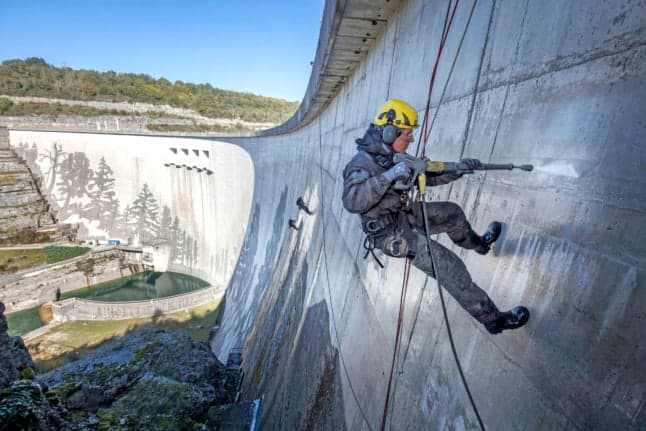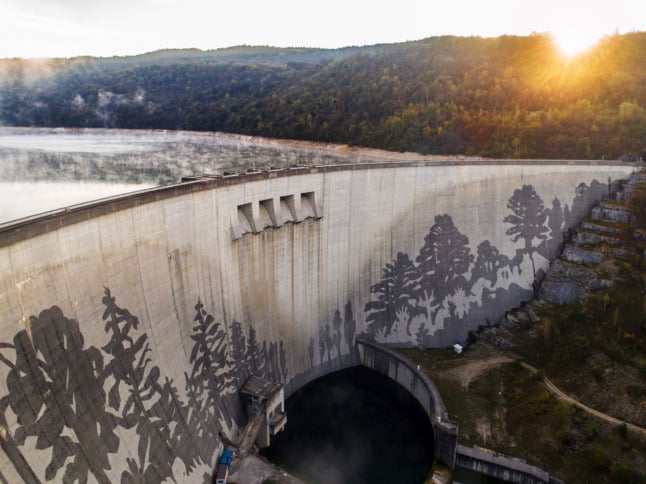German artist turns dirty walls into art via 'reverse graffiti'

German graffiti artist Klaus Dauven has brought a twist to the street art: he carefully cleans walls to leave intricate works of art in the remaining dirt.
Dauven's latest work is his largest to date: it is emblazoned on a huge dam in France covering an area the size of six or seven football fields.
"Some of my artworks are quite large-scale," he says after completing an elaborate work that required 2,500 laser points to be completed.
Along with a team of eight, Dauvan cleaned sludge from the back of a dam in Vouglans near that French-Swiss border.
Poor weather in the summer interrupted the work.
"After the deluge we had to start all over again," Dauven says. But now "La Forêt" ("The Forest") is complete.
The artist, who hails from Kreuzau in North Rhine-Westphalia, is considered a pioneer of the art form known as "reverse graffiti."
In "Reverse Graffiti" walls aren't sprayed with paint, but treated with high-pressure cleaners. With extremely high pressure of 250 bar, a water jet cuts and sprays deposited dirt from the surfaces, leaving behind silhouette-like motifs.
He did not invent "Reverse Graffiti" entirely on his own, Dauven admits: "Independently of me, the Englishman Paul 'Moose' Curtis also came up with the idea around the same time."
It was 1997 when Dauven, who studied at the art academy in Düsseldorf and in Münster, came up with the idea.
READ ALSO:
- ‘Balconies, life, art’: Berlin’s locked-in artists display their work
- Three arrested after ‘biggest art heist in modern history’ in Dresden
At the time, he was drawing on a sheet of paper measuring almost two by two metres, with a lot of coal dust. "I failed one drawing," he says. "When I sucked the dust off the paper with a hoover, the idea was there."
"Reverse graffiti is the more conceptual form of graffiti and certainly more tolerable in the eyes of the building owners," says art historian Gregor Jansen, who heads the Düsseldorf Kunsthalle.
"Through the effect of the negative, of taking away, a reversal takes place. The visual message is exposed," says Jansen.
In his view, the minimalist approach of reverse graffiti is the more interesting form.
Bridges, dam walls and harbour piers
Because Dauven's art form is very costly and difficult to sell, he depends on a sponsor in order to realise his works.
A German manufacturer of high-pressure cleaners supports him when he is on the road - as in France - with several industrial climbers, other helpers and 100-metre-long water hoses.
In the meantime, the 55-year-old has brought his large works to life in Germany, France, Japan and South Korea. He has created artworks on bridges, dam walls and harbour piers, leaving behind images of plants, animals and faces.

Dauven's forest scene comes to life on a dam in France. Photo: picture alliance/dpa/Kärcher | David Franck
When choosing motifs, he says he is inspired above all by the environment around the structure he works on.
Subject to the elements, his artworks are, however, ephemeral.
"It depends on the slope of the walls, the direction of the sky and the climate," he said. "In Japan, my drawing on a dam wall was completely gone after two years, in the Eifel region it lasted five to six years."
READ ALSO: Germany sets aside €52 million in scholarships for freelance artists: How and where to apply
However, his reverse graffiti designs are documented as photographs in illustrated books.
What distinguishes his works from conventional graffiti, he says, is also the level of public acceptance: "It also pleases people who are not so art-savvy," he explained. "I don't get any hostility."
So far, Cologne has been the only city to get have any "reverse graffiti" removed.
"But those were not my works in Cologne, but by an artist who works under the name 'Sei Leise' (be quiet, in English)," says Dauven.
Comments
See Also
Dauven's latest work is his largest to date: it is emblazoned on a huge dam in France covering an area the size of six or seven football fields.
"Some of my artworks are quite large-scale," he says after completing an elaborate work that required 2,500 laser points to be completed.
Along with a team of eight, Dauvan cleaned sludge from the back of a dam in Vouglans near that French-Swiss border.
Poor weather in the summer interrupted the work.
"After the deluge we had to start all over again," Dauven says. But now "La Forêt" ("The Forest") is complete.
The artist, who hails from Kreuzau in North Rhine-Westphalia, is considered a pioneer of the art form known as "reverse graffiti."
In "Reverse Graffiti" walls aren't sprayed with paint, but treated with high-pressure cleaners. With extremely high pressure of 250 bar, a water jet cuts and sprays deposited dirt from the surfaces, leaving behind silhouette-like motifs.
He did not invent "Reverse Graffiti" entirely on his own, Dauven admits: "Independently of me, the Englishman Paul 'Moose' Curtis also came up with the idea around the same time."
It was 1997 when Dauven, who studied at the art academy in Düsseldorf and in Münster, came up with the idea.
READ ALSO:
- ‘Balconies, life, art’: Berlin’s locked-in artists display their work
- Three arrested after ‘biggest art heist in modern history’ in Dresden
At the time, he was drawing on a sheet of paper measuring almost two by two metres, with a lot of coal dust. "I failed one drawing," he says. "When I sucked the dust off the paper with a hoover, the idea was there."
"Reverse graffiti is the more conceptual form of graffiti and certainly more tolerable in the eyes of the building owners," says art historian Gregor Jansen, who heads the Düsseldorf Kunsthalle.
"Through the effect of the negative, of taking away, a reversal takes place. The visual message is exposed," says Jansen.
In his view, the minimalist approach of reverse graffiti is the more interesting form.
Bridges, dam walls and harbour piers
Because Dauven's art form is very costly and difficult to sell, he depends on a sponsor in order to realise his works.
A German manufacturer of high-pressure cleaners supports him when he is on the road - as in France - with several industrial climbers, other helpers and 100-metre-long water hoses.
In the meantime, the 55-year-old has brought his large works to life in Germany, France, Japan and South Korea. He has created artworks on bridges, dam walls and harbour piers, leaving behind images of plants, animals and faces.

Dauven's forest scene comes to life on a dam in France. Photo: picture alliance/dpa/Kärcher | David Franck
When choosing motifs, he says he is inspired above all by the environment around the structure he works on.
Subject to the elements, his artworks are, however, ephemeral.
"It depends on the slope of the walls, the direction of the sky and the climate," he said. "In Japan, my drawing on a dam wall was completely gone after two years, in the Eifel region it lasted five to six years."
READ ALSO: Germany sets aside €52 million in scholarships for freelance artists: How and where to apply
However, his reverse graffiti designs are documented as photographs in illustrated books.
What distinguishes his works from conventional graffiti, he says, is also the level of public acceptance: "It also pleases people who are not so art-savvy," he explained. "I don't get any hostility."
So far, Cologne has been the only city to get have any "reverse graffiti" removed.
"But those were not my works in Cologne, but by an artist who works under the name 'Sei Leise' (be quiet, in English)," says Dauven.
Join the conversation in our comments section below. Share your own views and experience and if you have a question or suggestion for our journalists then email us at [email protected].
Please keep comments civil, constructive and on topic – and make sure to read our terms of use before getting involved.
Please log in here to leave a comment.